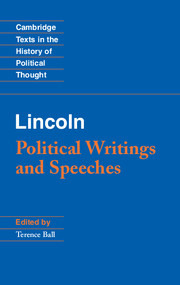Book contents
- Frontmatter
- Contents
- Preface
- Introduction
- Chronology
- Biographical synopses
- A note on sources and abbreviations
- Bibliographical note
- I Political Writings and Speeches
- II Notes and Fragments
- 36 On Government (1854?)
- 37 On Slavery (1854?)
- 38 On Slavery and Democracy (1858?)
- 39 On Pro-slavery Theology (1858)
- 40 On the Struggle against Slavery (c. July 1858)
- 41 On Racial (In)equality 1
- 42 On Racial (In)equality 2
- 43 The Declaration of Independence includes all men
- 44 On Slavery, Property, and the Constitution
- 45 On Labor and Capital 1 (c. 1846–7)
- 46 On Labor and Capital 2
- 47 On Labor and Capital 3
- 48 On Liberty
- 49 On the Thirteenth Amendment (abolition of slavery)
- Index
46 - On Labor and Capital 2
Address to the Wisconsin State Agricultural Society (September 30, 1859)
Published online by Cambridge University Press: 05 April 2013
- Frontmatter
- Contents
- Preface
- Introduction
- Chronology
- Biographical synopses
- A note on sources and abbreviations
- Bibliographical note
- I Political Writings and Speeches
- II Notes and Fragments
- 36 On Government (1854?)
- 37 On Slavery (1854?)
- 38 On Slavery and Democracy (1858?)
- 39 On Pro-slavery Theology (1858)
- 40 On the Struggle against Slavery (c. July 1858)
- 41 On Racial (In)equality 1
- 42 On Racial (In)equality 2
- 43 The Declaration of Independence includes all men
- 44 On Slavery, Property, and the Constitution
- 45 On Labor and Capital 1 (c. 1846–7)
- 46 On Labor and Capital 2
- 47 On Labor and Capital 3
- 48 On Liberty
- 49 On the Thirteenth Amendment (abolition of slavery)
- Index
Summary
. . . The world is agreed that labor is the source from which human wants are mainly supplied. There is no dispute upon this point. From this point, however, men immediately diverge. Much disputation is maintained as to the best way of applying and controlling the labor element. By some it is assumed that labor is available only in connection with capital – that nobody labors, unless somebody else, owning capital, somehow, by the use of that capital, induces him to do it. Having assumed this, they proceed to consider whether it is best that capital shall hire laborers, and thus induce them to work by their own consent; or buy them, and drive them to it without their consent. Having proceeded so far they naturally conclude that all laborers are necessarily either hired laborers, or slaves. They further assume that whoever is once a hired laborer, is fatally fixed in that condition for life; and thence again that his condition is as bad as, or worse than that of a slave. This is the “mud-sill” theory.
But another class of reasoners hold the opinion that there is no such relation between capital and labor, as assumed; and that there is no such thing as a freeman being fatally fixed for life, in the condition of a hired laborer, that both these assumptions are false, and all inferences from them groundless. They hold that labor is prior to, and independent of, capital; that, in fact, capital is the fruit of labor, and could never have existed if labor had not first existed – that labor can exist without capital, but that capital could never have existed without labor. Hence they hold that labor is the superior – greatly the superior – of capital.
- Type
- Chapter
- Information
- LincolnPolitical Writings and Speeches, pp. 236 - 238Publisher: Cambridge University PressPrint publication year: 2012

